Tooth decay is a common dental problem that occurs when acid-producing bacteria present in plaque build-up on teeth deteriorate the enamel, which is the hard outer layer of the tooth.
If tooth decay is not treated on time, it can result in several complications such as toothache, infection, and even tooth loss. However, the good news is that tooth decay is preventable through several steps that can help preserve the health of your teeth and gums.
Effective Ways to Avoid Tooth Decay
1. Brushing Properly and Regularly
Brushing your teeth is the most crucial step in maintaining excellent oral hygiene and preventing tooth decay. Brush your teeth at least two times a day, especially before going to sleep, to remove plaque and food particles.
Use fluoride toothpaste, which helps strengthen the enamel and decrease the risk of cavities. Also, brush your tongue to eliminate bacteria and refresh your breath.
2. Flossing Daily
Flossing is necessary to remove food debris and plaque from between your teeth and gums, which a toothbrush can’t reach. Floss at least once daily before bedtime, using a gentle back-and-forth motion to avoid injuring your gums.
You can also use an interdental cleaner or a water flosser to clean between teeth and around braces or other dental work.
3. Eating a Healthy Diet
Your diet can influence your oral health significantly. Avoid sugary and acidic drinks and foods that can cause erosion of the enamel. Instead, choose food items rich in fiber, vitamins, calcium, and low in sugar.
Incorporating fruits such as apples, strawberries, and fiber-rich vegetables like celery, carrots in your diet can help remove plaque and bacteria from your teeth.
4. Using Fluoride Mouthwash
Fluoride mouthwashes are an effective way to rinse your mouth after brushing, as they can help reinforce the enamel, fight against bacteria, and reduce acid production.
Use fluoride mouthwash at least once daily as advised by your dental professional to avoid tooth decay.
5. Limiting Snacking
Constant snacking or sipping on sugary drinks throughout the day is a major contributor to tooth decay. When you consume excess sugary foods and drinks, it leaves bacteria in your mouth, which produces harmful acids that can erode your enamel.
If you can’t do without snacking or drinking sugary drinks, limit it to once or twice a day and follow it up with brushing, flossing or use fluoride mouthwash to lessen the risk of tooth decay.
6. Regular Dental Visits
Visiting the dentist regularly can help prevent tooth decay before it sets in. Get dental cleanings and checkups every six months to remove plaque, check for cavities, and catch problems early.
Your dentist can also recommend specific fluoride treatments or sealants to increase the strength of your teeth and protect against bacteria and acid.
7. Ditching Tobacco Products
Smoking cigarettes, cigars, or using other tobacco products increases your chances of developing tooth decay, gum disease, and oral cancer.
Tobacco consumption causes your mouth to develop harmful bacteria, bad breath, and stains your teeth, among other oral health complications. Quitting tobacco is the best step to improve your oral health and reduce your risk of tooth decay.
8. Drinking Plenty of Water
Drinking water is an excellent way to keep your mouth healthy and prevent tooth decay. Water can help wash away food particles, reduce acid production, and keep your mouth hydrated.
Opt for fluoridated water if possible since it helps strengthen your teeth and reduce the risk of cavities.
9. Chewing Sugarless Gum
Chewing sugar-free gum between meals stimulates saliva production, which neutralizes harmful acid and bacteria. This action helps remove food debris, decreasing the risk of tooth decay and improving your breath.
Look for gums certified by the American Dental Association for optimal benefits.
10. Getting Dental Sealants
Dental sealants are a thin, clear material applied to the chewing surfaces of teeth to prevent tooth decay. They form a protective barrier that seals out bacteria and harmful acids, reducing the risk of dental cavities in children and adults.
Sealants are usually placed on the molars and premolars of children to safeguard from early cavities.
Conclusion
Tooth decay is common but preventable. Regular brushing, flossing, consuming a healthy diet, limiting snacking, drinking plenty of water, and eliminating tobacco products can help lessen the risk of tooth decay.
Also, seeing your dental professional at least twice a year for checkups and preventive treatments is a significant step in maintaining excellent oral hygiene and fresh breath. By following these practices, you can ensure a healthy, beautiful smile!.




























